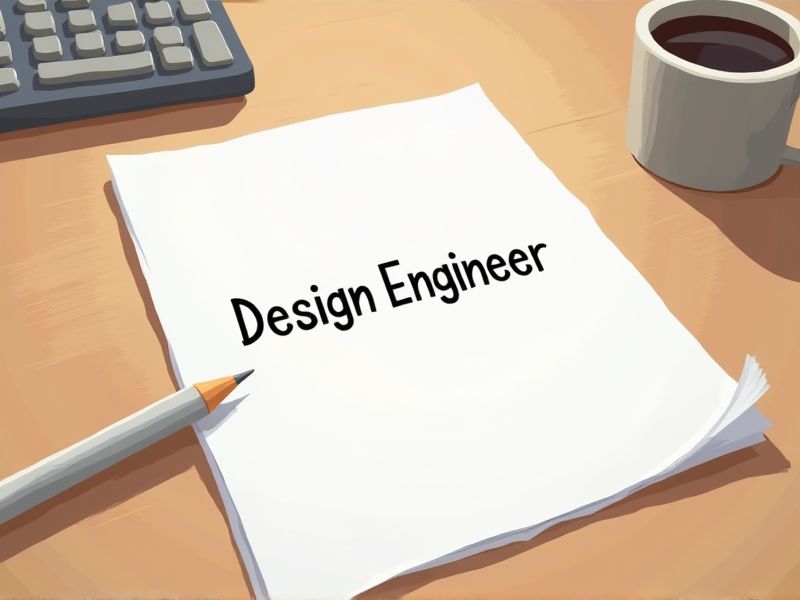
Design engineers are responsible for creating solutions that are both functional and innovative. Obtaining certain certifications enhances their technical skills and credibility in an increasingly competitive job market. Certifications demonstrate a commitment to professional growth and adherence to industry standards. Some important certifications can boost your career as a design engineer.
Certified SolidWorks Associate (CSWA)
Earning a Certified SolidWorks Associate (CSWA) enhances a design engineer's credibility by validating their proficiency in SolidWorks software, a widely used tool in the engineering field. This certification often leads to increased job opportunities, as many employers look for candidates who can demonstrate their skills and commitment to professional development. Having a CSWA ensures that engineers have a thorough understanding of design principles, improving the efficiency and effectiveness of their work. The structured approach to learning through the CSWA program develops problem-solving skills that are crucial in creating innovative and reliable designs.
Certified SolidWorks Professional (CSWP)
Obtaining the Certified SolidWorks Professional (CSWP) credential enhances a design engineer's technical proficiency, which often leads to higher productivity in modeling tasks. This certification validates the engineer's expertise in using advanced features of SolidWorks, making them more competitive in the job market. Companies seeking to improve design accuracy and reduce development time frequently prioritize candidates with certified expertise. The CSWP designation can lead to better job opportunities and potential salary increases due to recognized advanced skills.
Autodesk Certified Professional: AutoCAD
Certification as an Autodesk Certified Professional in AutoCAD provides design engineers with a standardized validation of their skills, which often translates to increased job opportunities and career advancement. Proficiency in AutoCAD ensures engineers can efficiently create precise 2D and 3D designs, thereby enhancing project accuracy. The certification also helps in minimizing errors during the design phase, thus reducing costs and time spent on revisions. Staying updated with AutoCAD certifications allows design engineers to align with industry standards and keep pace with technological advancements.
Autodesk Certified Professional: Inventor
Achieving Autodesk Certified Professional: Inventor recognition enhances a design engineer's expertise in 3D mechanical design, leading to improved project outcomes. Certification validates an engineer's capability to efficiently use advanced tools, which boosts productivity. The credential adds credibility, making engineers more attractive to employers or clients seeking highly skilled professionals. A certified professional often commands higher salary and opens doors to leadership roles, due to demonstrated proficiency and commitment.
Professional Engineering (PE) License
A Professional Engineering (PE) License ensures accountability and public trust, as it signifies that the engineer meets the rigorous standards required to protect public safety. In certain industries, only licensed engineers can approve and seal engineering documents, indicating that the designs comply with all applicable codes and standards. Obtaining a PE license often leads to greater job opportunities and career advancement, as many employers prefer or require it for higher-level positions. Legal and professional liability protection can be enhanced with a PE license, safeguarding both the engineer and their employer in the event of a project failure or litigation.
Project Management Professional (PMP)
The complexity and scope of design projects often require a structured approach, which PMP certification provides through standardized methodologies. Design engineers frequently lead project teams where PMP skills enhance leadership and team coordination, improving project outcomes. Budget constraints and time management are critical in design projects, and PMP training equips engineers with tools to optimize resource allocation and scheduling. PMP certification also increases a design engineer's credibility and career advancement opportunities, as it signals expertise in handling multifaceted projects.
Six Sigma Green Belt Certification
Design engineers often face complex challenges in optimizing processes and ensuring product quality. Obtaining a Six Sigma Green Belt certification provides them with a structured methodology and analytical skills to identify inefficiencies and improve process designs. This certification enhances their ability to make data-driven decisions, leading to reduced waste and increased product reliability. Employers value these skills, as they align with industry standards for excellence and innovation.
Certified Manufacturing Engineer (CMfgE)
A Certified Manufacturing Engineer (CMfgE) bridges the gap between design and production, ensuring design concepts are feasible for manufacturing. Their expertise in manufacturing processes enhances the efficiency and cost-effectiveness of production, aligning design specifications with manufacturing capabilities. They identify potential issues early, reducing the likelihood of costly redesigns or production delays. Their understanding of industry standards and best practices ultimately enhances the overall quality and performance of the final product.
ANSYS Certified Professional
Obtaining ANSYS Certified Professional status empowers a design engineer with validated expertise in using ANSYS software, which enhances their capability to perform accurate simulations and analyses. This certification can increase a professional's marketability, as companies often seek individuals with proven proficiency in leading simulation tools to minimize design errors and optimize product performance. Mastery of ANSYS tools through certification enables engineers to efficiently solve complex design challenges, supporting faster decision-making processes. The credential also reflects a commitment to professional growth, signaling to employers and clients that the engineer stays current with advanced engineering technologies.
Certified Product Design Engineer (CPDE)
Becoming a Certified Product Design Engineer (CPDE) enhances a design engineer's credibility and showcases an advanced understanding of design principles. The certification often leads to better job prospects and opportunities for career advancement as companies value certified professionals. CPDE training ensures that engineers are well-versed in the latest design tools and methodologies, which improves project efficiency and innovation. Possession of the certification can lead to improved collaboration with cross-functional teams, as certified individuals are trained to communicate and implement ideas effectively.
Summary
With new certifications, you enhance your credibility as a design engineer, which can lead to increased trust from employers and clients. This trust often results in better job opportunities and potentially higher salaries as your skills are validated. Recognized credentials also equip you with advanced knowledge, making you more efficient and innovative in your projects. Over time, your career trajectory may accelerate, as certifications distinguish you in a competitive job market.
